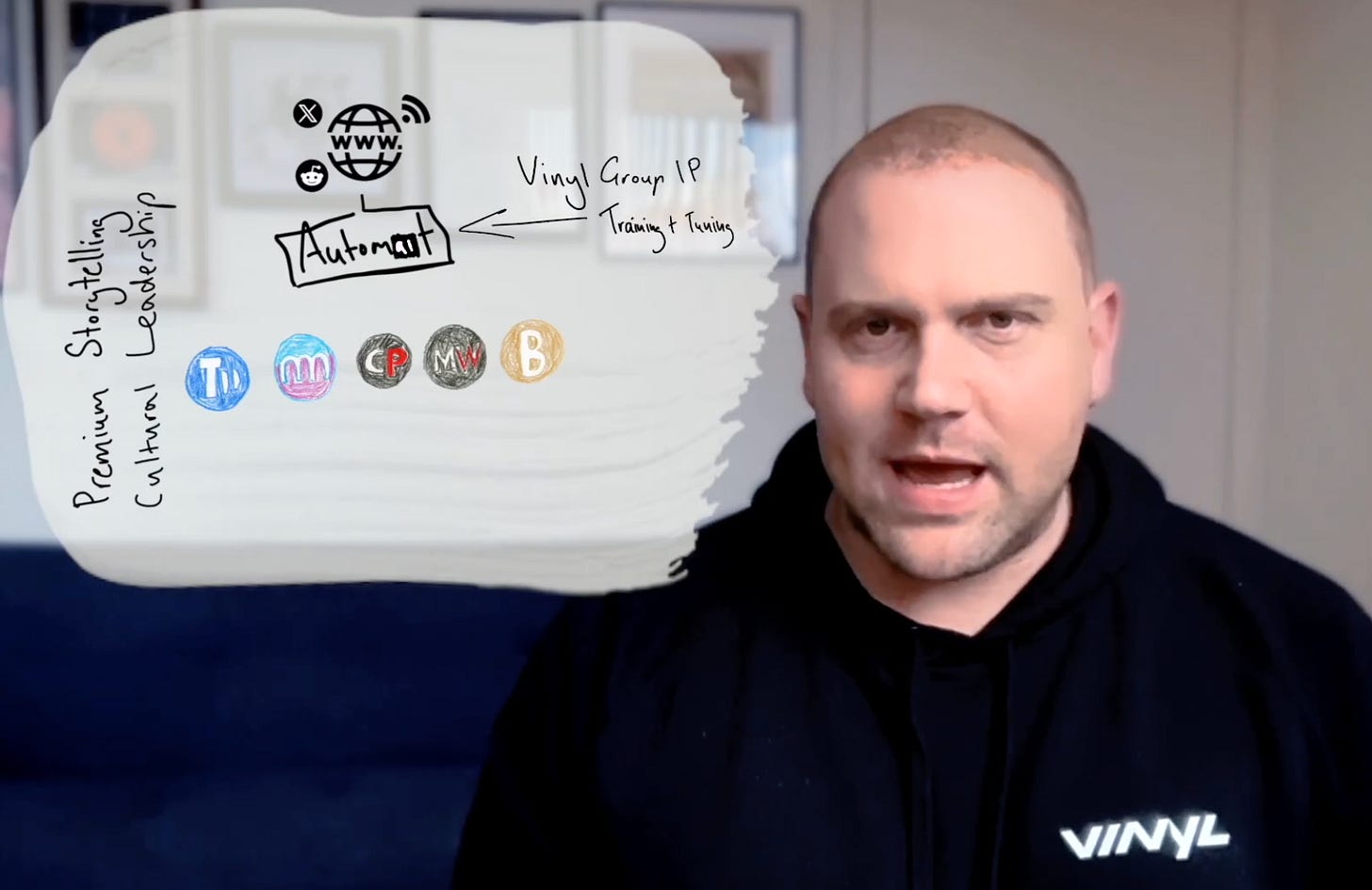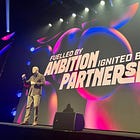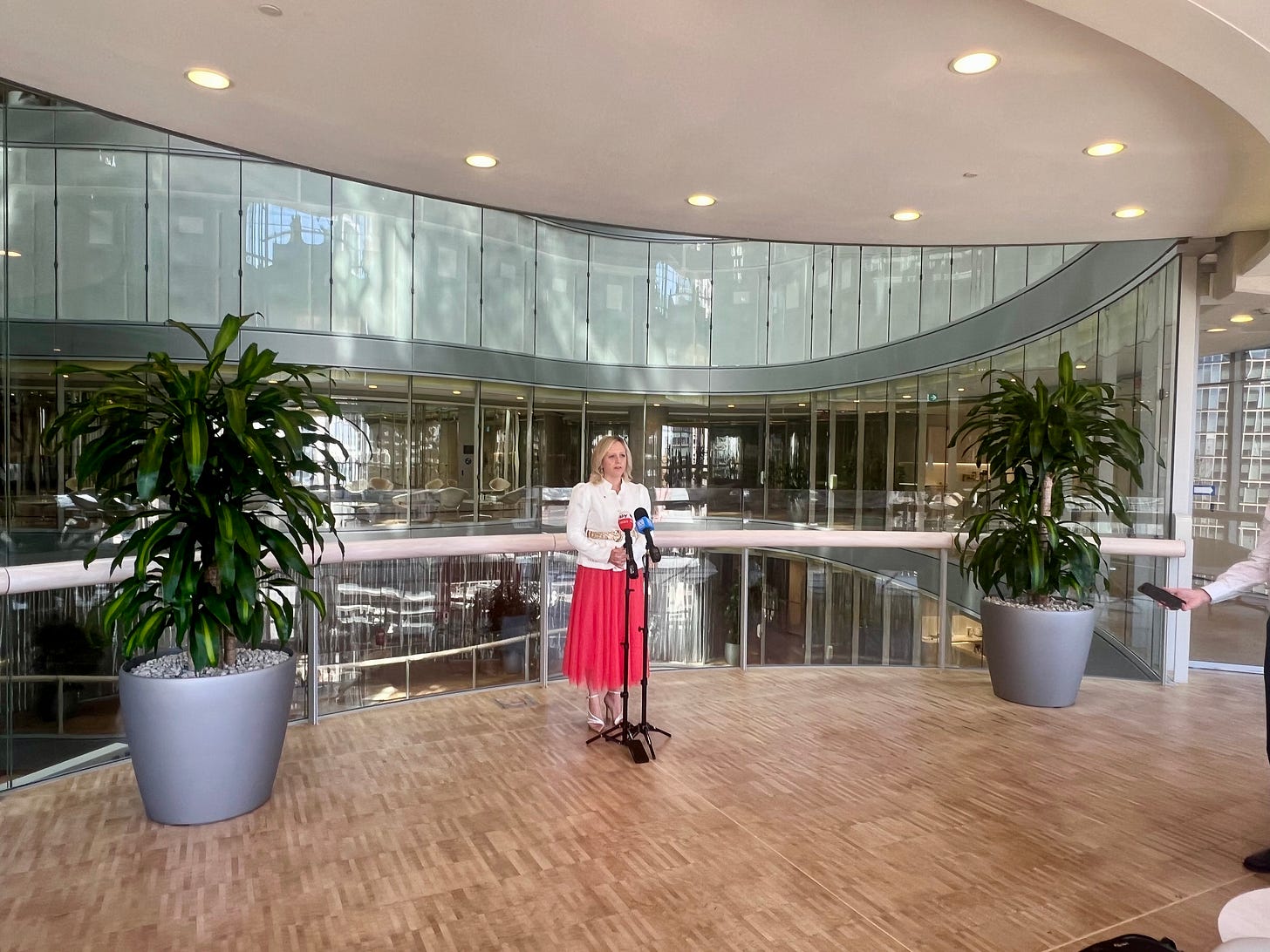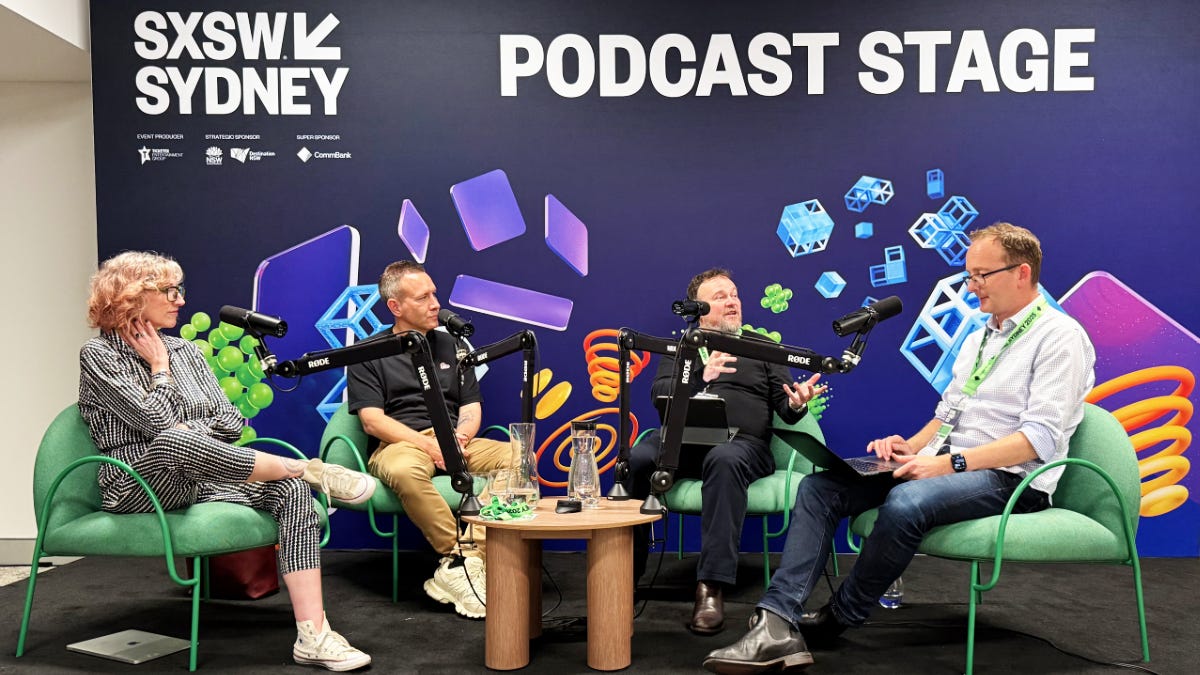BotW: Vinyl Group's enslopification; agency extinction and ACMA's email problem
Welcome to Best of the Week, mostly written in Virgin’s Sydney Lounge as Friday afternoon stretched into Friday night, watching departure times blow out as a storm blows through. Want to find out if I made it home to Tasmania? Read til the end to find out (spoiler alert: First World rant incoming.)
Today: What to make of Vinyl Group’s big AI plan; Mat Baxter’s prediction that holdcos’ extinction-level event is here; and ACMA’s email discipline.
Happy Evaluate Your Life Day for tomorrow. Good plan.
This edition marks the end of an era - after more than four years, it will be Unmade’s last newsletter written on Substack.
On Monday we’ll move Unmade onto the same content stack as Mumbrella. Much as I love Wordpress and tolerate Hubspot, I’ll miss Substack enormously. A grant from Substack helped fund Unmade’s first year, and if its philosophy had been a little more supportive towards ad serving, I’d have loved to stick around. Indeed, to keep a toe in the ecosystem, we will continue to publish the Unmade podcast via Substack.
Which means this is your very last chance to sign up to a paid membership of Unmade and lock in all of the current benefits. On Monday, we’re going to stop accepting new paying members of Unmade. Instead we’ll be offering membership of an expanded Mumbrella Pro as we bring the two brands closer together.
All Unmade membership perks will be carried across, including complimentary tickets to Unlock and Compass for our annual paying members. These won’t be available to anyone else as part of the new Mumbrella Pro membership.
Your paid membership also includes exclusive analysis and access to our content archive, which goes behind the paywall six weeks after publication.
Upgrade today. Or tomorrow. Then you’re out of time.
That’s show business
My half week in Sydney started with the Nine Upfronts on Wednesday afternoon. We’ve already covered them, so I won’t go over the same ground here.
That said, reflecting on the event 72 hours later, the tone is still the thing I find myself thinking about. Nine’s deliberate choice was all business and no show. There were no lighter moments in the script. Apart from a single moment when somebody called out from the audience, chief sales officer Matt James didn’t crack a smile, and neither did his colleagues. They may well have judged the appetite of their customers correctly, but when did TV become such a grim business?
The loneliness of a politician
On Thursday morning I found myself on the way back to the office from a meeting in North Sydney when an email alert arrived for a press conference with shadow communications minister Melissa McIntosh. The Opposition has been testing communications minister Annika Wells and her response to the Optus Triple Zero disaster, and McIntosh finally got a meeting with the telco’s CEO Stephen Rue.
On something of a whim, as the Commonwealth Parliamentary Office was kind of on my way, I decided to drop by, as I was yet to see McIntosh in action.
Seeing the news sausage being made is always interesting. Journos get to attend such CPO pressers via the slowest and hottest goods lift in the southern hemisphere. When the lift finally came I shared the trip to the 21st floor with a man delivering an enormous quantity of individually wrapped Tim Tams, and a tradie with both arms full of plumbing hoses.
The turnout was just me, a journo from the ABC, camera operators from Sky News and the ABC, and McIntosh’s Parliamentary adviser.
McIntosh did have a strong point to make. Part of the problem on the day of the outage was the Australian Communications and Media Authority’s apparent failure to open an email from Optus alerting them to the problem, because it went to an old email address. Given that was at least a factor, maybe the ACMA isn’t best placed to run the investigation.
McIntosh went a little further when I asked whether she still had confidence in the ACMA as a regulator. Currently, she does not. That will be an intriguing issue to explore should she ever make it into government.
Before filing a story for Mumbrella, I emailed the team at ACMA, twice, to give them a chance to comment. They didn’t reply. It would seem that email is not currently their strong point.
Vinyl’s big AI plan for publishing
And I hope you didn’t think I was going to get to the end of the week without talking about Vinyl Group’s long awaited reboot as an AI-led publisher.

Vinyl fascinates me, and I have a sneaking admiration for CEO Josh Simons who accidentally became a publisher less than two years ago, and says he has found a formula that has eluded his more traditional counterparts.
Simons became involved after selling music industry social networking platform Vampr into the business then known as Jaxsta. Since then he’s played the hand he has been dealt, as well as anybody could.
The company later rebranded as Vinyl Group, with Simons promoted to the top job after bringing in investor Richard White. The multi-billionaire White currently owns 40.1% of Vinyl Group through Realwise Group Holdings while Songtradr, in which White is also a major investor, owns a further 16.7%. You may recall that White has been the subject of some insalubrious Australian Financial Review allegations about his personal conduct.
The top ten investors in Vinyl Group control 73% of the company stock which may explain why its market capitalisation is a remarkably high $125m. That’s a lot for a loss-making company that this week reported quarterly revenues of just $4.9m, with a negative cashflow of $835,000 just in the last quarter.
Music fan White backed the strategy of Simons - formerly in the Australian band Buchanan - to acquire music industry and culture titles, including The Brag, Mediaweek, Concrete Playground and the Australian franchises of Rolling Stone and Variety.
In the update, Vinyl repeated its claim that in the current quarter it will finally turn a profit.
Which brings us on to the substance (for want of a better word) of Wednesday’s announcement about the company’s AI plans, which it has been teasing for more than three months.
Vinyl Media will, it claims, use AI to create ten times as much content despite cutting editorial jobs.
Accompanied by an upbeat soundtrack, Simons explained more in the accompanying video (which appears above): “Producing content today relies on hundreds of small, repetitive tasks. Monitoring feeds, sorting stories, drafting, formatting, tagging, sourcing images, embedding metadata, distribution across channels and so the list goes. These are essential steps but they drain time from the writers and the editors whose skills are best spent optimising high quality content.”
To a point. But a lot of those sound like the tasks involved in churnalism, rather than original reporting to which they are incidental.
Simons went on: “Introducing Project AutomAIt. The goal is simple. Automate the robotic tasks and free up the creative ones. Every day, hundreds of new stories flow in from across the web through RSS feeds and social sources like X and Reddit.”
It sounds like these “new stories” appearing on RSS feeds and Reddit, have already been researched and written by someone else. A challenge for the publishing world is that while expression of language can be copyrighted, the underlying facts cannot. So it would be legal to take others content and use AI to completely rewrite it, and disguise the fact.
This practice has predated generative AI, underpinning the low value Made For Advertising sites, designed to suck up cheap programmatic ad impressions. Mediaweek itself reported on the IAB’s warnings against MFA back in 2024.
Simons explained more about how the system will work: “Automation now plays a role sourcing, curating, drafting and tagging, while editors and writers focus where they add the most value.”
Again, that means sourcing and curating other people’s content, not doing actual journalism. I struggle to see how that will result in offering additional value to the audience, and therefore the advertisers.
Not that Simons presented it that way. He went on: “Premium storytelling and cultural leadership. Articles take form through the drafting process before editorial review, enriched by decades of proprietary content and music metadata. Editors step in to tweak and approve, before hitting publish and going live.”
That reminds me of what Mi3 said when it launched its “Fast News” daily AI-written digest of repurposed press releases and ASX announcements. It would always be overseen by humans, it promised. You may recall this month’s embarrassing error when Mi3 let its newsletter with the hallucinated claim that more than 25% of Southern Cross Austereo shareholders had banded together to block the merger with Seven West Media. They had not.
Simons also repeated a claim often made by agency holdco bosses that all this AI-led efficiency will see staff redirected to more interesting work, rather than job cuts,
“This isn’t about replacing editorial, it’s about empowering it and supercharging productivity,” said Simons. Admittedly that was accompanied in the announcement with the information that Vinyl has “structurally lowered the fixed cost base”(read: made lots of roles redundant, including its head of publishing and head of editorial).
Then came Simons’ promise that those RSS feeds and Reddit rewrites will create a new wave of content: “Our goal is to 10x daily content output by the end of this financial year as we iteratively rollout this internal technology stack across our mastheads and editorial teams, starting with our own titles.”
The words “our own titles” contains a clue. I would imagine that Penske Media Corporation, owner of the Variety and Rolling Stone licences, might have a problem with AI slop appearing under their mastheads.
So they will start with mastheads Vinyl actually owns like The Brag, Concrete Playground and Mediaweek.
It wouldn’t be hard to create ten times more content on the Brag which is organised under eight pillars of content: fashion & beauty; internet culture; technology; travel; gaming; comedians; food & drink; and film & TV.
The Brag’s top fashion and beauty content is an eBay-sponsored article from November 2024. The most recent internet culture article was a piece about the Australian government removing TikTok from their devices, posted nearly two-and-a-half years ago. The most recent technology article was a headphones review posted ten months ago today. The Brag’s most recent item in the comedy section was a preview of Amy Poehler coming to the Sydney Opera House in May 2024. Evergreen content this is not.
Despite my scepticism, a small part of me wonders whether, as a fresh pair of eyes to publishing, Simons sees things I simply do not with my jaded 36 years in the game.
We are learning from the Vinyl experiment. And it’s fascinating to watch.
By the way, if you work in publishing, please consider coming to our Publish conference, the week after next. We’ll be talking about the challenges the industry is facing, and we’ve priced it to be affordable, even for publishers who are up against it.
Mat Baxter’s agency extinction timeline
One of my more cynical industry friends messaged one of my group chats this week: “When does SXSW finish? I’m quite tired from the effort of ignoring it.”
And it was indeed one of those weeks where a regular question was “Are you at SXSW?” Followed by: “Is it busy?”
My perception was that in its third year, SXSW Sydney was not as busy as major sponsor the NSW government would have hoped. The five-year deal aims to encourage interstate and international travel to the conference but I noticed that hotel prices for the week actually fell as the event came nearer.
For my part, we accepted a last minute invitation to do the Mumbrellacast live on stage on Thursday afternoon, and we had a lot of fun.
In no small part that was thanks to the presence of Mat Baxter, who brought the unique combination of having run a global holdco agency, knowing the local industry landscape, and with no boss, being unencumbered in speaking his mind. Not that has ever been an issue for him.
The business model of agency networks has broken and AI is just the latest challenge, he argued. With credibility to make the prediction, he told us: “I think it’s an extinction level event that networks are facing. I don’t think networks will exist in five years.”
“The first to go would be Dentsu, outside of Japan, then WPP, Omnicom/IPG and then Publicis, in that order.”
Gulp.
Afterwards, one of my funnier industry friends summed up the SXSW experience: “Very much enjoyed your session. Apologies for walking out early, but Tyra Banks is giving a talk on her ice cream.”
Time to leave you to your weekend.
If you’d like a little more from me, do check out the Mumbrellacast. It was a good one. As well as Mat Baxter’s take on the holdco extinction level event, we discussed Vinyl Group’s new AI strategy, and the Nine Upfronts.
And in yesterday’s episode of MediaLand for ABC Radio National we had fun with our guest Mitch Churi, discussing radio’s killing season, which is now upon us.
And you might recall I promised to tell you how I did with Virgin. As it happens, I’m writing this part on Saturday morning at my Sydney Airport hotel . I won’t be home for several hours yet.
Having seen that there might be runway delays because of an expected storm, I headed for the airport early for my trip home to Tasmania via Melbourne. Really early. I was there by 2pm, for a 7pm boarding time.
I have a relatively crappy status with Virgin - gold - and it showed. Given my tight connection time in Melbourne, I asked whether they might put me on an earlier flight for the first leg. They were perfectly civil but uninterested in doing so.
Sure enough there was a distant storm - I saw a single flash of lightning, and the airport went down to one runway.
Virgin has recently introduced an innovation. You can see details not just of your flight, but the previous leg your aircraft is coming from. So I took some comfort when I realised that although my flight out of Sydney was now showing up as delayed, it was the very same plane that would be flying on to Launceston.
And then, without an explanation, they bumped me from that flight to one due to depart half an hour later. With a sinking feeling, I returned to the desk, to ask to be put back on the flight I had booked. No dice, it was full. It wouldn’t be fair to bump someone from the flight, they told me, having just bumped me from the flight. I could try ringing customer service though.
Working against the clock, I gave it a go. Trying to explain to somebody for whom English was not their first language, that if they just put me back on the flight I booked, I would make the connection because it was the same aircraft, was far harder than you’d think.
Each time she’d put me on hold, then come back and read out a script about safety being the greatest priority. And I would explain that I completely understood the delay, but if they could only put me back on my original flight, I could still make it home because their app was showing it to be the same aircraft. She would then put me on hold, before coming back to tell me that it was a 737. I’d explain I wasn’t talking about the same type, I was talking about it being the actual same aircraft. No matter how many times I explained it, I never did make myself understood.
I tried one more time with the desk. No dice. They cheerfully informed me that because it was a weather delay, I’d need to book a hotel at my own expense.
That’s fully a First World problem. I realise I’m lucky that was the worst thing that happened to me yesterday. I was, however, still somewhat glum when I trudged out to my airport hotel on what felt like a perfect, non-stormy evening.
I hope your weekend has started better than mine.
Toodlepip…
Tim Burrowes
Publisher - Unmade + Mumbrella
tim@unmade.media










